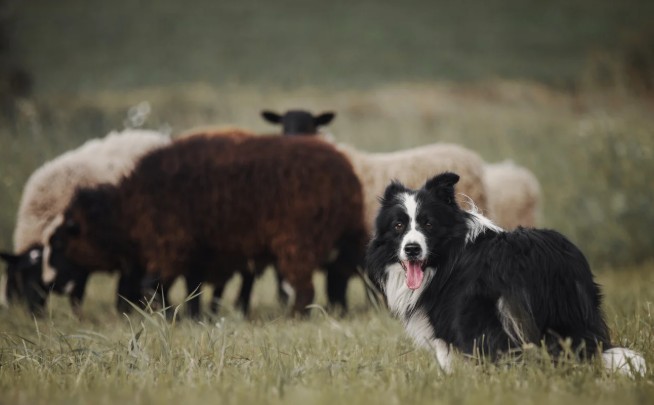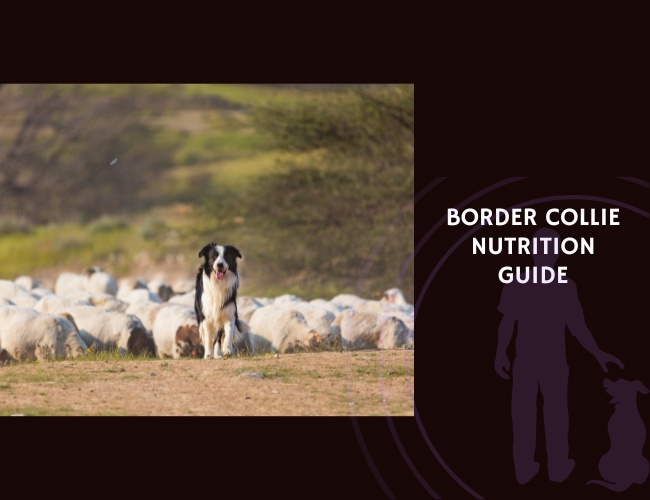Your Border Collie’s piercing gaze follows every movement as you prepare their meal. This isn’t just hunger—it’s the focused attention of one of the world’s most intelligent and energetic dog breeds. Understanding how to properly nourish your Border Collie means appreciating their unique heritage as tireless working dogs who’ve herded sheep across the Scottish borderlands for centuries. Let us guide you through everything you need to know about feeding these remarkable athletes of the canine world.
Understanding Your Border Collie’s Unique Nutritional Needs
The Metabolic Marvel of Working Dogs
Border Collies possess what veterinary nutritionists call “athletic metabolism”—a finely-tuned system that efficiently converts food into explosive bursts of energy. Your Border Collie’s metabolic rate runs approximately 15-20% higher than sedentary breeds, even at rest. This means their cells burn through nutrients faster, demanding a carefully calibrated nutritional approach.
Key metabolic characteristics include:
- Enhanced mitochondrial density in muscle cells
- Rapid glucose utilization during work
- Efficient fat oxidation for sustained energy
- Heightened protein turnover for muscle maintenance
Did you know that a working Border Collie can burn up to 2,000 calories in a single day of herding? Even your family companion who “only” plays fetch and takes long walks needs significantly more fuel than the average couch-potato pup. This metabolic intensity shapes every aspect of their nutritional requirements.
Digestive System Specifics
Your Border Collie’s digestive system reflects their evolutionary journey from wild hunters to precision herders. They’ve retained the wolf’s relatively short digestive tract, optimized for processing nutrient-dense foods quickly. This efficient system comes with both advantages and considerations for modern feeding.
Understanding their digestive traits:
- Stomach capacity represents about 2-3% of body weight
- Transit time from eating to elimination: 12-24 hours
- Higher stomach acid production than many breeds
- Sensitive gut microbiome requiring consistent feeding
You might notice your Border Collie tends toward food motivation without being gluttonous—this reflects their working heritage where meals were earned through labor. Their moderate stomach size means they often do better with multiple smaller meals rather than one large feeding, especially given their activity levels.
The Lean Machine Tendency
Border Collies naturally tend toward leanness, with ideal body condition showing a visible waist and easily felt ribs under a thin layer of fat. This isn’t skinny—it’s athletic. However, this tendency means they have less metabolic “cushion” than stockier breeds. Missing meals or inadequate nutrition shows up quickly in coat quality, energy levels, and performance.
Your Border Collie’s body composition typically includes:
- 16-20% body fat (compared to 25-30% in less active breeds)
- Higher percentage of lean muscle mass
- Denser bone structure relative to body size
- Minimal subcutaneous fat storage
This lean physiology means every calorie counts, and the quality of those calories matters even more. 🐾
Macronutrient Requirements: Building Blocks of Border Collie Health
Protein: The Performance Foundation
Protein serves as the cornerstone of your Border Collie’s diet, supporting everything from their lustrous coat to their lightning-fast reflexes. While AAFCO guidelines suggest 18% minimum crude protein for adult maintenance, your Border Collie thrives on significantly more—typically 22-28% for moderately active dogs and up to 30% for working or competing dogs.
Quality matters as much as quantity:
- First ingredient should be named meat (chicken, lamb, salmon)
- Multiple protein sources provide amino acid variety
- Digestibility exceeds 85% in premium proteins
- Muscle meat, organ meat, and meat meals offer different benefits
Your Border Collie’s protein needs change with activity. That weekend agility competitor needs more protein Monday morning than Thursday evening. This dynamic requirement means paying attention to your dog’s schedule and adjusting portions accordingly.
Life stage protein adjustments:
- Puppies (8 weeks-12 months): 28-32% crude protein
- Active adults (1-7 years): 24-28% crude protein
- Senior dogs (7+ years): 22-26% crude protein
- Pregnant/nursing females: 28-32% crude protein
Fat: High-Octane Fuel for Endless Energy
Fat provides more than twice the energy per gram compared to protein or carbohydrates, making it crucial for your Border Collie’s demanding lifestyle. Beyond pure energy, dietary fat supports cognitive function—essential for a breed renowned for problem-solving abilities.
Optimal fat profiles include:
- 12-16% fat for moderately active Border Collies
- 16-20% fat for highly active or working dogs
- Balanced omega-6 to omega-3 ratio (4:1 to 5:1)
- Sources like salmon oil, flaxseed, and chicken fat
The right fat balance shows in your Border Collie’s gleaming coat and bright eyes. Too little fat, and you’ll notice a dull coat and decreased stamina. Too much can lead to weight gain, particularly problematic for this agile breed where extra pounds stress joints designed for nimble movement.
Carbohydrates: The Controversial Energy Source
While dogs don’t have a specific carbohydrate requirement, your Border Collie can efficiently utilize quality carbs for quick energy. The key lies in choosing digestible sources that provide sustained energy without blood sugar spikes.
Beneficial carbohydrate sources:
- Sweet potatoes (rich in beta-carotene)
- Brown rice (easily digestible energy)
- Oatmeal (soluble fiber for gut health)
- Quinoa (complete protein and complex carbs)
Some Border Collies show sensitivity to grains, manifesting as skin irritations or digestive upset. If you notice excessive scratching, ear infections, or loose stools, consider a grain-free trial under veterinary guidance. Remember, grain-free doesn’t mean carb-free—legumes and potatoes can provide necessary energy while avoiding common triggers.
Micronutrient Profile: The Hidden Heroes
Essential Vitamins for Border Collie Vitality
Your Border Collie’s vitamin needs reflect their high-performance lifestyle. These micronutrients work synergistically, supporting everything from their famous “eye” (that intense herding stare) to their tireless work ethic.
Critical vitamins include:
Vitamin A (Vision & Immunity):
- Supports keen eyesight essential for herding
- Recommended: 5,000-10,000 IU per kg of diet
- Sources: Liver, carrots, sweet potatoes
B-Complex Vitamins (Energy Production):
- Thiamine, riboflavin, niacin fuel cellular energy
- Higher needs due to increased metabolism
- Sources: Whole grains, meat, eggs
Vitamin D (Bone Health):
- Crucial for calcium absorption
- Limited sun synthesis in dogs
- Recommended: 500-700 IU per kg of diet
Vitamin E (Antioxidant Protection):
- Protects against exercise-induced oxidative stress
- Recommended: 50-100 IU per kg of diet
- Works synergistically with selenium
Mineral Balance: Supporting Structure and Function
Minerals form the structural foundation of your Border Collie’s body while enabling countless biochemical reactions. The high-impact nature of their movement—quick turns, sudden stops, explosive jumps—demands robust mineral support.
Key minerals and their roles:
Calcium & Phosphorus (Skeletal System):
- Ideal ratio: 1.2:1 to 1.5:1 calcium to phosphorus
- Critical during growth to prevent developmental issues
- Adult needs: 1.2% calcium, 1.0% phosphorus (dry matter basis)
Zinc (Immune Function & Coat Health):
- Border Collies may have higher zinc needs
- Deficiency shows as dull coat, skin issues
- Recommended: 80-120 mg per kg of diet
Iron (Oxygen Transport):
- Supports endurance through efficient oxygen delivery
- Needs increase with activity level
- Sources: Red meat, organ meat, fortified foods
Selenium (Antioxidant Defense):
- Works with Vitamin E to prevent muscle damage
- Particularly important for active dogs
- Recommended: 0.3-0.5 mg per kg of diet
The interplay between minerals means balance matters more than individual levels. Over-supplementation can be as harmful as deficiency, making commercial diets formulated for active breeds often the safest choice. 🧡

Common Food Sensitivities: When Good Food Goes Wrong
Identifying Border Collie Food Sensitivities
Your normally energetic Border Collie seems off—scratching more, experiencing digestive upset, or showing less enthusiasm for activities. Food sensitivities affect approximately 15-20% of Border Collies, though many cases go undiagnosed or are mistaken for other issues.
Common sensitivity triggers include:
- Beef (most common protein allergen)
- Dairy products (lactose intolerance)
- Wheat and corn (grain sensitivities)
- Soy (digestive irritant)
- Artificial colors and preservatives
Recognition signs to watch for:
- Chronic ear infections or head shaking
- Excessive paw licking or chewing
- Recurring hot spots or skin irritations
- Intermittent soft stools or vomiting
- Excessive gas or bloating
The intelligence that makes Border Collies exceptional can complicate sensitivity diagnosis—they may hide discomfort or adapt their behavior to avoid triggering foods, making careful observation essential.
The Elimination Diet Approach
When sensitivities are suspected, an elimination diet provides the gold standard for identification. This process requires patience but yields definitive answers about your Border Collie’s triggers.
Elimination diet protocol:
- Choose a novel protein and carbohydrate (e.g., venison and sweet potato)
- Feed only these ingredients for 8-12 weeks
- Monitor all symptoms carefully
- Gradually reintroduce suspected triggers one at a time
- Wait 2-3 weeks between new introductions
- Document any reactions
Your Border Collie’s food-motivated nature can make elimination diets challenging—they may attempt to supplement their restricted diet with unauthorized snacks. Ensure all family members understand the importance of dietary compliance during testing.
Managing Sensitivities Long-Term
Once you’ve identified triggers, managing your Border Collie’s sensitivities becomes straightforward. Many dogs with sensitivities thrive on limited ingredient diets or carefully selected commercial foods.
Successful management strategies:
- Rotate proteins to prevent new sensitivities
- Read all ingredient labels carefully
- Maintain consistent feeding routines
- Consider digestive supplements (probiotics, enzymes)
- Keep detailed food and symptom logs
Remember, food sensitivities can develop over time. A food your Border Collie tolerated for years might suddenly cause issues. Stay observant and responsive to changes in their condition.
Life Stage Nutritional Adjustments
Puppy Power: Fueling Rapid Growth (8 Weeks – 12 Months)
Your Border Collie puppy arrives as a whirlwind of energy wrapped in fluff, growing at an astounding rate while developing the neural pathways that will support their legendary intelligence. This critical period demands precise nutrition to support both physical and cognitive development.
Puppy-specific requirements:
- Caloric needs: 2-3 times adult maintenance
- Protein: 28-32% (dry matter basis)
- Fat: 15-20% for brain development
- DHA supplementation for cognitive function
- Calcium: 1.2-1.8% (carefully controlled)
Feed your Border Collie puppy 3-4 times daily until 6 months, then transition to 2-3 meals. Their stomach capacity limits large meals, while their metabolism demands frequent refueling. Watch for the characteristic “Border Collie pause” during meals—they may stop eating to process interesting sounds or movements, returning when satisfied nothing requires herding.
- Weekly weigh-ins until 6 months
- Body condition scoring every 2 weeks
- Adjust portions based on growth curve
- Avoid overfeeding to prevent joint stress
Adult Athletes: Peak Performance Nutrition (1-7 Years)
Adult Border Collies embody canine athleticism, whether they’re working sheep, competing in agility, or enthusiastically fetching for hours. Their nutritional needs reflect this sustained high performance, requiring careful calibration based on actual activity rather than breed assumptions.
Activity level classifications:
- Light activity (house pet): 24-26% protein, 12-14% fat
- Moderate activity (regular exercise): 26-28% protein, 14-16% fat
- High activity (working/competing): 28-30% protein, 16-20% fat
Your Border Collie’s intelligence means they may exaggerate their activity needs to earn extra food. Use body condition scoring rather than those pleading eyes to guide portions. The ideal Border Collie shows a visible waist from above, tucked abdomen from the side, and ribs easily felt but not seen.
Performance nutrition strategies:
- Feed 2-3 hours before intense activity
- Provide small snacks during extended work
- Ensure constant fresh water access
- Consider electrolyte supplementation in heat
- Post-exercise feeding within 30-60 minutes
Senior Wisdom: Adapted Nutrition (7+ Years)
Your senior Border Collie may still insist they can work all day, but their nutritional needs have shifted. The goal becomes maintaining quality of life while supporting aging systems and potentially managing chronic conditions.
Senior-specific adjustments:
- Moderate protein (22-26%) for muscle maintenance
- Reduced calories if activity decreases
- Enhanced omega-3 fatty acids for joint support
- Increased antioxidants (vitamins C, E, selenium)
- Glucosamine/chondroitin supplementation
Many senior Border Collies benefit from more frequent, smaller meals as digestive efficiency decreases. Their remarkable intelligence remains sharp, but physical changes require nutritional support for cognitive function—consider foods enriched with medium-chain triglycerides (MCTs) for brain health.
Common senior concerns:
- Arthritis management through weight control
- Kidney function support with controlled phosphorus
- Dental health affecting food choices
- Decreased appetite requiring palatability enhancement
Reproductive Nutrition: Supporting New Life
Breeding Border Collies requires exceptional nutritional support for the dam throughout pregnancy and lactation. The physical demands of producing and nursing intelligent, active puppies can quickly deplete maternal reserves without proper feeding.
Pregnancy nutrition (weeks 1-9):
- Weeks 1-5: Maintain normal adult feeding
- Weeks 6-9: Gradually increase to 1.5-2x normal intake
- Higher protein (28-32%) and fat (16-20%)
- Calcium supplementation only under veterinary guidance
Lactation demands:
- Peak lactation: 3-4x normal caloric needs
- Free-choice feeding often necessary
- 30-35% protein to support milk production
- Constant fresh water access critical
The intensity of Border Collie mothers extends to puppy care—they may neglect their own needs while tending puppies. Monitor body condition closely and intervene if weight loss becomes concerning. 🐾

Breed-Specific Health Risks: Nutritional Prevention and Management
Hip Dysplasia: The Weight-Joint Connection
Hip dysplasia affects approximately 12-15% of Border Collies, though careful breeding has reduced incidence. While genetics play the primary role, nutrition significantly impacts development and progression of this debilitating condition.
Nutritional prevention strategies:
- Maintain lean body condition throughout life
- Avoid rapid growth in puppies
- Balanced calcium:phosphorus ratio (1.2-1.5:1)
- Omega-3 supplementation for anti-inflammatory effects
- Glucosamine/chondroitin from young adulthood
Your Border Collie’s natural athleticism can mask early hip discomfort—they may compensate with altered movement patterns. Watch for subtle signs like preferring one side when turning or reluctance to jump into vehicles.
Weight management protocol:
- Weekly body condition scoring
- Adjust portions based on activity
- Low-impact exercise (swimming) for affected dogs
- Consider prescription joint diets
- Regular veterinary monitoring
Gastric Dilatation-Volvulus (Bloat): A Life-Threatening Emergency
While Border Collies aren’t among the highest-risk breeds for bloat, their deep chest and active nature create vulnerability. This condition, where the stomach fills with gas and potentially rotates, requires immediate veterinary intervention and can be influenced by feeding practices.
Bloat prevention through nutrition:
- Feed multiple small meals rather than one large meal
- Avoid exercise 1 hour before and after eating
- Slow down fast eaters with puzzle feeders
- Limit water consumption immediately after meals
- Avoid foods that increase gas production
High-risk feeding behaviors to modify:
- Gulping food without chewing
- Drinking excessive water post-exercise
- Eating immediately after intense activity
- Competition with other dogs during feeding
Your Border Collie’s focused intensity can extend to eating—they may inhale food as efficiently as they herd sheep. Using slow-feed bowls or scatter feeding can enforce a healthier pace while providing mental stimulation.
Exercise-Induced Collapse (EIC): Fueling for Stability
Some Border Collies carry the genetic mutation for Exercise-Induced Collapse, experiencing weakness or collapse after intense activity. While primarily genetic, nutritional support can help manage this condition.
Nutritional management strategies:
- Consistent blood sugar through complex carbohydrates
- Adequate B-vitamins for nerve function
- Electrolyte balance during activity
- Pre-exercise feeding 2-3 hours prior
- Cool-down nutrition within 30 minutes post-exercise
Understanding your Border Collie’s limits and providing appropriate nutritional support helps prevent episodes while maintaining quality of life. Many affected dogs lead full lives with careful management.
Epilepsy: The Diet-Seizure Connection
Epilepsy affects 2-4% of Border Collies, with emerging research suggesting dietary interventions may help manage seizure frequency and severity alongside traditional medications.
Dietary considerations for epileptic Border Collies:
- Consistent feeding times to maintain stable blood sugar
- Medium-chain triglycerides (MCT oil) supplementation
- Avoid foods with artificial colors/preservatives
- Consider ketogenic diet under veterinary supervision
- Omega-3 fatty acids for neuroprotection
Track seizure patterns relative to feeding to identify potential triggers. Some Border Collies show increased seizure activity with certain proteins or during dietary transitions.
Collie Eye Anomaly: Nutritional Eye Support
This genetic condition affects many Border Collies to varying degrees. While nutrition cannot cure CEA, certain nutrients support overall eye health and may slow progression of vision changes.
Eye-supporting nutrients:
- Vitamin A for retinal health
- Lutein and zeaxanthin (found in leafy greens)
- Omega-3 fatty acids for retinal function
- Vitamin E and C as antioxidants
- Zinc for vitamin A metabolism
Regular eye examinations combined with nutritional support helps maintain your Border Collie’s quality of life despite vision challenges. 🧡
Recommended Feeding Methods: Finding Your Perfect Approach
Commercial Kibble: Convenience Meets Nutrition
High-quality commercial kibble remains the most popular choice for Border Collie owners, offering complete nutrition with unmatched convenience. The key lies in selecting formulas designed for active breeds with your Border Collie’s specific needs in mind.
Selecting superior kibble:
- First 3 ingredients should be named proteins
- No by-product meals or generic “meat meal”
- Grain-inclusive or grain-free based on tolerance
- AAFCO certification for life stage
- Caloric density matching activity level
Feeding guidelines for kibble:
- Divide daily portion into 2-3 meals
- Measure precisely—Border Collies notice portion changes
- Store in airtight containers to maintain freshness
- Transition gradually over 7-10 days when changing
- Monitor stool quality as indicator of tolerance
Your Border Collie’s intelligence means they quickly learn feeding routines. Use this to your advantage by incorporating training or puzzle feeders to make mealtimes mentally stimulating while slowing consumption.
Raw Feeding: Back to Ancestral Roots
The raw feeding movement has gained traction among Border Collie enthusiasts, particularly those seeking to maximize performance in working or sporting dogs. This approach requires commitment but can yield impressive results in coat quality, energy levels, and overall vitality.
Raw feeding models:
- BARF (Biologically Appropriate Raw Food): 60-80% raw meaty bones, 20-40% fruits/vegetables
- Prey Model: 80% muscle meat, 10% bone, 10% organs
- Commercial raw: Pre-balanced frozen formulas
Safety and balance considerations:
- Source from reputable suppliers
- Maintain strict hygiene protocols
- Ensure calcium:phosphorus balance
- Supplement with omega-3 fatty acids
- Regular veterinary monitoring recommended
Raw feeding your Border Collie requires understanding their individual needs—some thrive while others experience digestive upset. Start with commercial raw formulas before attempting home preparation to ensure nutritional balance.
Home-Cooked Diets: Personalized Nutrition
Preparing home-cooked meals for your Border Collie offers ultimate control over ingredients while strengthening your bond through food preparation. However, achieving nutritional balance requires careful planning and often professional guidance.
Home cooking essentials:
- Work with veterinary nutritionist for recipes
- Use nutrition software to ensure balance
- Rotate proteins for variety
- Include appropriate supplements
- Batch cook and freeze for convenience
Sample balanced recipe foundation:
- 40% lean protein (rotating sources)
- 30% complex carbohydrates
- 20% vegetables (varied colors)
- 10% healthy fats and supplements
- Calcium source if not feeding bones
Your Border Collie may initially resist home-cooked food if raised on commercial diets. Their intelligence allows them to be selective—persist with gradual transitions and find their preferred flavors.
Combination Feeding: Best of All Worlds
Many Border Collie owners find success combining feeding methods—perhaps kibble for breakfast, raw for dinner, with home-cooked toppers. This approach provides variety while ensuring nutritional completeness.
Successful combination strategies:
- Base diet of high-quality kibble (75%)
- Fresh food toppers (25%)
- Raw treats for training
- Bone broth for hydration
- Seasonal fresh additions
Monitor your Border Collie’s response to different combinations. Their adaptable digestion typically handles variety well, but introduce changes gradually to prevent upset.
Brilliant. Boundless. Bio-Optimized.
Your Border Collie doesn’t slow down — neither should their nutrition.
From sunrise herding instincts to sunset fetch marathons, they burn clean, fast, and deep. That’s not just energy — that’s mitochondria in overdrive. Fuel them like the elite athletes they are.
Protein isn’t optional — it’s operating code.
Whether chasing sheep or shadowing your every move, your Collie’s agility and reflexes rely on precise amino acid profiles. No filler, no guesswork. Just high-quality, named-source proteins that speak the language of performance.



Fats power the mind as much as the muscle.
Behind that penetrating stare is a cognitive engine that demands omega synergy. Feed the brain. Protect the joints. Sustain the sprint.
🧠 This isn’t about feeding a dog — it’s about fuelling a phenomenon.
Feed what they are, not what you wish they were. Science-built. Instinct-honoring. Border Collie ready.
Supplement Strategies: Enhancing the Foundation
Core Supplements for Active Border Collies
While a balanced diet should provide most nutrients, certain supplements can optimize your Border Collie’s health and performance. The key lies in targeted supplementation based on individual needs rather than a “kitchen sink” approach.
Foundation supplements to consider:
Omega-3 Fatty Acids (Fish Oil):
- Dose: 20-30mg EPA/DHA per pound body weight
- Benefits: Joint health, coat quality, cognitive function
- Sources: Wild salmon oil, sardine oil, algae-based options
Glucosamine/Chondroitin:
- Preventive dose: 15mg/lb glucosamine, 10mg/lb chondroitin
- Start at 2-3 years for joint protection
- Particularly important for agility competitors
Probiotics:
- Support digestive health and immunity
- Especially beneficial during stress or diet changes
- Look for multi-strain formulas with prebiotics
Vitamin E:
- Antioxidant protection for active dogs
- 1-2 IU per pound body weight
- Best given with fatty meals for absorption
Performance Enhancement Supplements
Working and competing Border Collies may benefit from targeted performance supplements, though these should complement, not replace, quality nutrition.
Performance-oriented options:
- L-carnitine for endurance and fat metabolism
- CoQ10 for cellular energy production
- Taurine for heart health (especially important)
- B-complex for energy metabolism
- Electrolyte supplements for hot weather work
Time supplementation appropriately—some work best given daily, while others benefit from strategic use around competitions or heavy work periods.
Natural Food-Based Supplements
Your Border Collie can benefit from whole food supplements that provide nutrients in their most bioavailable forms. These additions can enhance commercial or home-prepared diets naturally.
Beneficial whole food additions:
- Eggs (complete protein, biotin)
- Sardines (omega-3s, calcium if with bones)
- Pumpkin (fiber for digestive health)
- Blueberries (antioxidants)
- Bone broth (joint support, hydration)
- Coconut oil (medium-chain triglycerides)
Introduce these gradually and monitor response. Your Border Collie’s individual preferences will guide which additions work best. 🐾
Practical Feeding Guidelines: Real-World Application
Calculating Your Border Collie’s Caloric Needs
Understanding your individual Border Collie’s caloric requirements prevents both obesity and undernourishment. While general guidelines exist, factors like metabolism, activity, and life stage create significant variation.
Basic caloric calculation:
- Resting Energy Requirement (RER) = 70 × (body weight in kg)^0.75
- Maintenance Energy Requirement (MER) = RER × activity factor
- Inactive/senior: 1.2-1.4
- Moderate activity: 1.5-1.8
- High activity: 2.0-3.0
- Working/lactating: 3.0-5.0
Example for 40-pound (18kg) Border Collie:
- RER = 70 × (18)^0.75 = 663 calories
- Moderately active: 663 × 1.6 = 1,061 calories/day
- Highly active: 663 × 2.5 = 1,657 calories/day
Adjust based on body condition rather than rigid adherence to calculations. Your Border Collie’s metabolism may run higher or lower than average.
Meal Timing and Frequency Optimization
Your Border Collie’s feeding schedule significantly impacts digestion, energy levels, and even behavior. Their working heritage means they adapt well to consistent routines while maintaining flexibility for varying activity levels.
Optimal feeding schedules:
- Puppies (8-16 weeks): 4 meals daily
- Adolescents (4-12 months): 3 meals daily
- Adults: 2-3 meals daily
- Seniors: 2-3 smaller meals daily
Activity-based timing:
- Morning meal: 30-60 minutes after waking
- Pre-activity: 2-3 hours before intense exercise
- Post-activity: Within 30-60 minutes for recovery
- Evening meal: 2-3 hours before bedtime
Your Border Collie’s intelligence means they quickly learn schedules—use this predictability to your advantage while maintaining flexibility for varying daily activities.
Managing Multiple Dog Households
Border Collies often live in multi-dog households, creating unique feeding challenges. Their herding instinct can manifest as resource guarding or attempting to control other dogs’ eating.
Multi-dog feeding strategies:
- Separate feeding stations out of sight
- Feed in crates if necessary
- Maintain consistent order (alpha first debate aside)
- Remove all bowls when meals finish
- Monitor for food stealing or bullying
Some Border Collies develop “helper” behaviors, attempting to herd other dogs to their bowls. While endearing, this can create stress—maintain clear boundaries during feeding times.
Travel and Competition Feeding
Your Border Collie’s active lifestyle likely includes travel for competitions, training, or adventures. Maintaining nutritional consistency during these times supports performance and prevents digestive upset.
Travel feeding guidelines:
- Pack enough regular food plus 25% extra
- Bring familiar water or gradual transition
- Maintain regular feeding times across time zones
- Reduce portions on travel days
- Pack measuring cups and supplements
Competition day nutrition:
- Light meal 3-4 hours before events
- Small high-protein snacks between runs
- Avoid trying new foods or treats
- Ensure constant water access
- Post-competition meal within 2 hours
Your Border Collie’s focus intensifies during competitions—they may refuse food when “working.” Respect this while ensuring adequate nutrition around events.
Troubleshooting Common Feeding Issues
The Picky Eater Paradox
Despite their food motivation, some Border Collies develop selective eating habits. Their intelligence allows them to train owners effectively—holding out for preferred foods or earning extras through manipulation.
Addressing picky eating:
- Rule out medical issues first
- Maintain strict meal schedules
- Remove uneaten food after 15-20 minutes
- Avoid adding increasingly tempting toppers
- Consider food puzzle toys for interest
- Ensure adequate exercise before meals
Remember, a healthy Border Collie won’t starve themselves. Consistency typically resolves pickiness within a few days, though their determination may test yours.
Managing Food Obsession
Conversely, some Border Collies develop intense food focus, gulping meals and constantly seeking more. This behavior can stem from genetics, early experiences, or learned behaviors.
Controlling food obsession:
- Use slow-feed bowls or puzzle feeders
- Scatter feeding in grass (natural foraging)
- Multiple small meals throughout day
- Training “settle” commands around food
- Avoid free-feeding
- Address underlying anxiety if present
Channel your Border Collie’s food drive positively through training. Their intelligence makes them excellent candidates for complex food-rewarded behaviors.
Weight Management Challenges
Maintaining ideal weight in Border Collies requires vigilance—their efficient metabolism means excess calories quickly become excess pounds, while their activity can mask gradual weight gain.
Weight loss strategies:
- Reduce calories by 10-20% initially
- Increase low-calorie vegetables for fullness
- Maintain or increase exercise gradually
- Weekly weigh-ins and body condition scoring
- Consider prescription weight management foods
- Rule out medical causes (hypothyroidism)
Preventing weight gain:
- Measure all food precisely
- Account for training treats (reduce meals)
- Regular body condition assessments
- Adjust for seasonal activity changes
- Resist those pleading Border Collie eyes
Your Border Collie may attempt to convince you they’re starving despite adequate nutrition. Their theatrical abilities rival their herding skills—stay strong! 🧡
Advanced Nutrition Topics: Cutting-Edge Considerations
Nutrigenomics: Personalized Nutrition Through DNA
Emerging science reveals how your Border Collie’s genetic makeup influences their nutritional needs. Genetic testing can identify predispositions affecting dietary requirements.
Genetic factors influencing nutrition:
- MDR1 mutation affecting supplement metabolism
- Exercise-induced collapse gene requiring dietary support
- Metabolic efficiency variations
- Food sensitivity predispositions
- Vitamin processing differences
While nutrigenomics remains developing science, understanding your Border Collie’s genetic profile can guide nutritional choices, particularly for performance dogs where small advantages matter.
Microbiome Management
Your Border Collie’s gut microbiome profoundly impacts overall health, from immunity to behavior. Supporting beneficial bacteria through nutrition represents a frontier in canine health.
Microbiome support strategies:
- Prebiotic fibers (chicory root, Jerusalem artichoke)
- Probiotic supplementation or fermented foods
- Diverse protein sources
- Minimal antibiotic use
- Stress reduction (affects gut health)
- Gradual dietary changes
Research suggests Border Collies’ microbiomes may differ from other breeds, potentially relating to their unique metabolism and activity levels.
Cognitive Nutrition for the Einstein of Dogs
Your Border Collie’s exceptional intelligence requires nutritional support throughout life. Emerging research identifies specific nutrients supporting cognitive function and potentially delaying age-related decline.
- DHA (docosahexaenoic acid) for neural function
- Medium-chain triglycerides for brain energy
- Antioxidants preventing oxidative damage
- B-vitamins for neurotransmitter production
- Phosphatidylserine for memory
Consider cognitive support beginning in middle age, before obvious decline appears. Your Border Collie’s problem-solving abilities deserve nutritional investment.
Seasonal Feeding Adjustments
Winter Nutrition Needs
Cold weather increases your Border Collie’s caloric requirements, particularly for those working or living outdoors. Their double coat provides insulation, but metabolic demands rise with temperature regulation.
Winter feeding adjustments:
- Increase calories by 10-25% for outdoor dogs
- Higher fat content for concentrated energy
- Warm water encourages hydration
- Monitor weight weekly—winter coats hide changes
- Consider vitamin D supplementation with less sunlight
Indoor Border Collies may actually need fewer calories in winter if activity decreases. Adjust based on individual lifestyle rather than season alone.
Summer Feeding Strategies
Hot weather creates unique challenges for your heat-sensitive Border Collie. Their work drive may override sensible heat management, requiring your intervention.
Summer nutrition modifications:
- Feed during cooler morning/evening hours
- Increase water content in food
- Electrolyte supplementation for workers
- Lighter meals during peak heat
- Frozen treats for enrichment and cooling
Monitor for heat stress signs—excessive panting, reluctance to eat, or lethargy. Your Border Collie may need encouragement to rest and eat appropriately during hot weather.
Transitional Season Considerations
Spring and fall bring changing activity levels and potential allergens. Your Border Collie’s nutritional needs may fluctuate with these transitions.
Seasonal transition tips:
- Gradual calorie adjustments with activity changes
- Monitor for environmental allergies affecting appetite
- Consider immune support during weather changes
- Adjust portions for changing daylight/activity
- Maintain consistent feeding times despite schedule changes
Making Informed Decisions: Your Border Collie’s Nutritional Journey
Creating Your Personalized Nutrition Plan
Every Border Collie is unique, despite breed tendencies. Creating an individualized nutrition plan requires observing your dog’s specific needs, activity level, and responses to different foods. This process evolves throughout their life, demanding flexibility and attention.
Steps to develop your plan:
- Assess current body condition and activity level
- Calculate baseline caloric needs
- Choose primary feeding method (kibble, raw, home-cooked)
- Select appropriate supplements
- Establish consistent feeding schedule
- Monitor and adjust based on results
Document your Border Collie’s journey—weight, energy levels, coat quality, and stool consistency provide valuable feedback. Their intelligence means they’ll quickly communicate preferences, though these don’t always align with nutritional needs.
Working with Veterinary Professionals
Your veterinarian serves as an essential partner in your Border Collie’s nutritional journey. Regular consultations ensure your feeding approach supports overall health while addressing breed-specific concerns.
Maximizing veterinary consultations:
- Bring detailed diet history to appointments
- Discuss activity levels honestly
- Request body condition scoring guidance
- Ask about breed-specific concerns
- Consider veterinary nutritionist referral for complex cases
- Update diet information in medical records
Some veterinarians lack extensive nutrition training—don’t hesitate to seek specialists for complex dietary needs or performance optimization. Your Border Collie deserves expert guidance.
Reading and Understanding Pet Food Labels
Pet food labels contain valuable information, but marketing claims can obscure nutritional facts. Understanding label interpretation empowers informed choices for your Border Collie.
Key label components:
- Ingredient list (descending order by weight)
- Guaranteed analysis (minimum/maximum percentages)
- Caloric content (kcal per cup or can)
- Feeding guidelines (starting point only)
- AAFCO nutritional adequacy statement
- Manufacturer contact information
Remember that ingredient splitting (listing similar ingredients separately) can misrepresent true composition. Focus on overall nutritional profile rather than impressive-sounding ingredients.
Cost Considerations Without Compromising Quality
Feeding your Border Collie optimally requires investment, but smart strategies can manage costs without sacrificing nutrition. Their efficient metabolism means quality matters more than quantity.
Budget-friendly quality feeding:
- Buy larger bags for better per-pound pricing
- Store properly to maintain freshness
- Consider subscription services for discounts
- Supplement premium kibble with fresh foods
- Join manufacturer loyalty programs
- Compare cost per calorie, not per pound
Your Border Collie’s health represents long-term investment—quality nutrition now prevents expensive health issues later. Balance immediate costs against lifetime wellness.
Common Myths and Misconceptions
“Border Collies Need Special Brain Food”
While Border Collies possess exceptional intelligence, they don’t require fundamentally different nutrition than other active breeds. However, ensuring adequate DHA during development and maintaining stable blood sugar does support their cognitive function.
The myth likely stems from their remarkable problem-solving abilities and trainability. Focus on overall quality nutrition rather than seeking “genius supplements”—their intelligence thrives with proper general nutrition.
“Working Lines Need Different Diets Than Show Lines”
While activity levels certainly differ between working and show Border Collies, the fundamental nutritional requirements remain similar. The key lies in adjusting quantities and caloric density rather than completely different approaches.
Working dogs need more calories and may benefit from higher fat content, but the same quality proteins, balanced minerals, and essential nutrients support both types. Let activity level, not lineage, guide feeding decisions.
“Grain-Free is Always Better”
The grain-free trend has particularly impacted Border Collie nutrition discussions. While some individuals truly have grain sensitivities, most Border Collies digest quality grains efficiently. Recent concerns about grain-free diets and dilated cardiomyopathy make this choice more complex.
Evaluate based on your individual dog’s response rather than broad assumptions. Many successful working Border Collies thrive on grain-inclusive diets, while others do better without. There’s no universal answer.
“Raw Feeding Guarantees Better Performance”
Raw feeding advocates often promise dramatic improvements in performance and health. While some Border Collies excel on raw diets, others perform equally well on high-quality commercial foods. The key lies in meeting nutritional needs, not the feeding philosophy.
Consider your lifestyle, expertise, and dog’s individual response when choosing feeding methods. The best diet is one you can maintain consistently while meeting all nutritional requirements.
Environmental and Ethical Considerations
Sustainable Feeding Choices
Your environmentally conscious approach can extend to your Border Collie’s nutrition. Sustainable protein sources and eco-friendly packaging reduce environmental impact without compromising nutrition.
Sustainable options include:
- Insect-based proteins (emerging option)
- Locally sourced ingredients
- Companies with carbon-neutral commitments
- Minimal packaging or recyclable materials
- Plant-forward formulas with complete proteins
- Nose-to-tail usage reducing waste
Your Border Collie’s health remains paramount, but many sustainable options provide excellent nutrition while supporting environmental stewardship.
Ethical Sourcing Considerations
The source of your Border Collie’s food ingredients matters for ethical and quality reasons. Understanding supply chains helps make informed choices aligned with your values.
Ethical factors to consider:
- Humanely raised meat sources
- Sustainable fishing practices for fish-based foods
- Fair labor practices in production
- Transparency in ingredient sourcing
- Support for local agriculture
- Animal welfare certifications
Many Border Collie owners find investigating food sources provides peace of mind while potentially improving quality. Your intelligent companion deserves thoughtfully sourced nutrition.
Conclusion: Your Border Collie’s Nutritional Success
Nourishing your Border Collie properly means more than filling their bowl twice daily. It’s about understanding their unique metabolic needs, respecting their genetic heritage, and adapting nutrition to support their remarkable capabilities throughout life. From the energetic puppy learning to channel their herding instincts to the wise senior who still insists on one more throw of the ball, proper nutrition forms the foundation of health and happiness.
Your Border Collie’s nutritional journey will include discoveries, adjustments, and probably a few challenges along the way. Their intelligence and sensitivity mean they’ll communicate their needs—sometimes subtly, sometimes dramatically. Stay observant, remain flexible, and remember that the perfect diet for your Border Collie is the one that keeps them healthy, energetic, and ready for whatever adventure you tackle together.
The time and effort invested in optimizing your Border Collie’s nutrition pays dividends through years of companionship, whether that’s working livestock at dawn, conquering agility courses, or simply being the most devoted friend you’ll ever have. They give us their legendary focus, tireless work ethic, and unwavering loyalty. In return, we owe them the gift of nutrition that fuels their extraordinary lives.
Is your Border Collie getting the nutrition they need to thrive? Take time this week to evaluate their current diet against their activity level and life stage. Your brilliant companion depends on you to make informed choices that support their health today and for all the adventures tomorrow brings. After all, a well-nourished Border Collie is a happy Border Collie—and there’s nothing quite like the joy of a Border Collie living their best life. 🐾🧡










